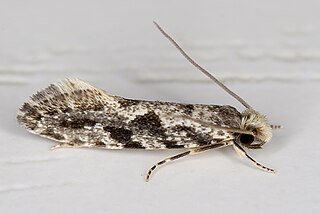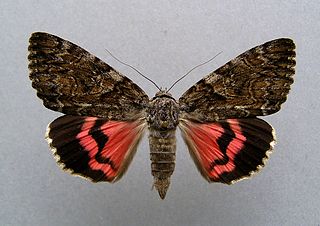
Catocala is a generally Holarctic genus of moths in the family Erebidae. The genus was erected by Franz von Paula Schrank in 1802. The moths are commonly known as underwing moths or simply underwings. These terms are sometimes used for a few related moths, but usually – especially when used in plural, not as part of a species name – they are used to refer to Catocala only.

Nemapogon granella is a species of tineoid moth. It belongs to the fungus moth family (Tineidae), and therein to the subfamily Nemapogoninae. It is the type species of its genus Nemapogon, and via that also of the subfamily Nemapogoninae. It is also the type species of the proposed genera Brosis and Diaphthirusa, which are consequently junior objective synonyms of Nemapogon.

Catocala junctura, the joined underwing or Stretch's underwing, is a moth in the family Erebidae. The species was first described by Francis Walker in 1858. It is found throughout temperate North America, ranging from New York and Pennsylvania west to Montana, Colorado, Oklahoma, Arizona, and into Texas, and north to southern Illinois, extreme southern Alberta and Saskatchewan; it has also been recorded west of the Rocky Mountains from California and south-eastern British Columbia. It is typically found near water, where the food plants of its caterpillar larvae grow plentifully.

Catocala agitatrix is a moth of the family Erebidae. It is found in the Russian Far East, China, Korea, Japan.
Catocala seiohbo is a moth of the family Erebidae first described by Katsumi Ishizuka in 2002. It is found in the Chinese provinces of Sichuan, Guangxi, Guangdong and Hunan.

Catocala kuangtungensis is a moth of the family Erebidae. It is found in China and Japan.

Catocala dejeani is a moth of the family Erebidae first described by Rudolf Mell in 1936. It is found in China and Taiwan.

Catocala dilecta is a moth of the family Erebidae first described by Jacob Hübner in 1808. It is found in north-western Africa through southern Europe to Asia Minor.
Catocala chenyixini is a moth in the family Erebidae. It is found in China (Chekiang).
Catocala ellamajor is a moth in the family Erebidae. It is found in China (Sichuan).

Catocala xarippe is a moth in the family Erebidae. It is found in Japan and the Russian Far East.
Catocala giuditta is a moth in the family Erebidae first described by Schawerda in 1934. It is found in Algeria.
Catocala jyoka is a moth in the family Erebidae. It is found in China in the province of Sichuan.
Catocala kasenko is a moth in the family Erebidae. It is found in China (Sichuan).
Catocala kaki is a moth in the family Erebidae. It is found in China (Shaanxi).

Catocala lupina is a moth in the family Erebidae first described by Gottlieb August Wilhelm Herrich-Schäffer in 1851. It is found from south-eastern Europe to south-western Siberia, Asia Minor and Transcaucasia.
Catocala maso is a moth in the family Erebidae. It is found in China (Guangdong).
Catocala gansan is a moth in the family Erebidae. It is found in China (Yunnan).

Catocala obscena is a moth in the family Erebidae first described by Sergei Alphéraky in 1879. It is found in Korea and China.
Catocala seibaldi is a moth in the family Erebidae. It is found in China (Shaanxi).











